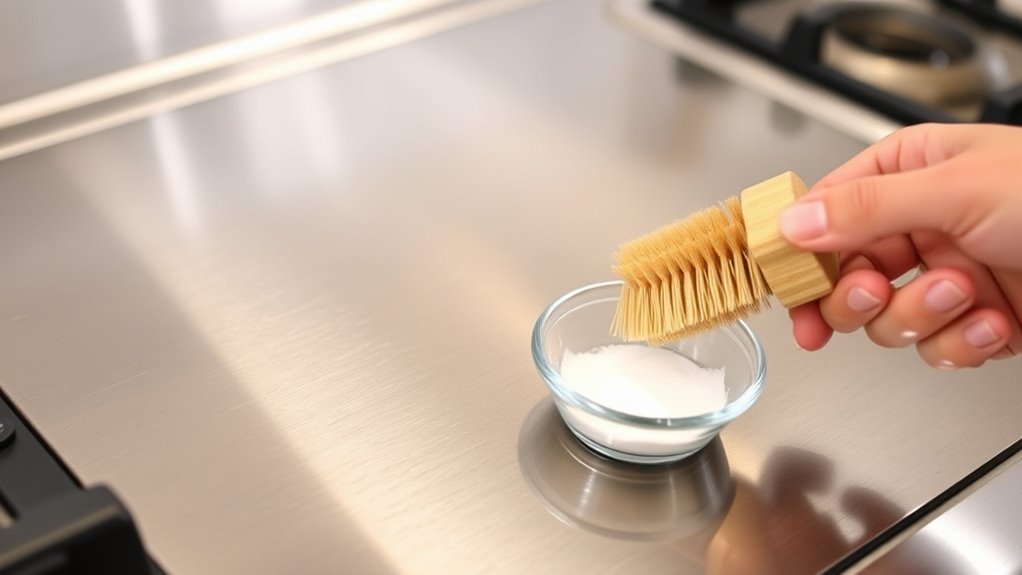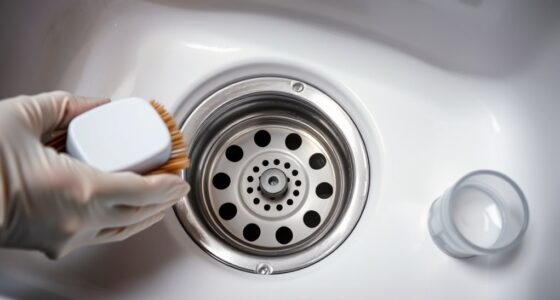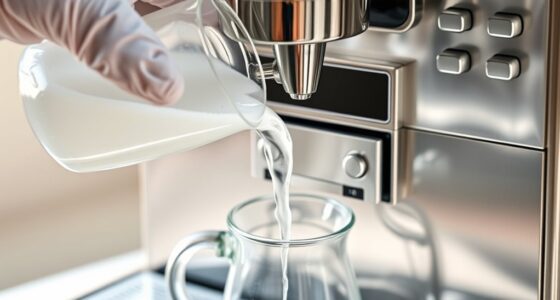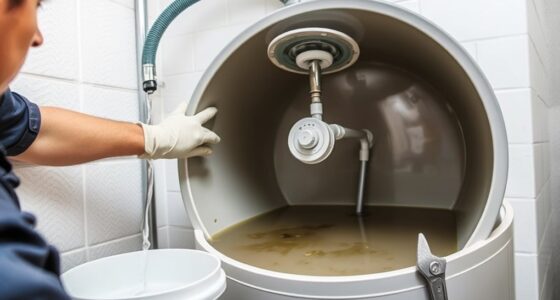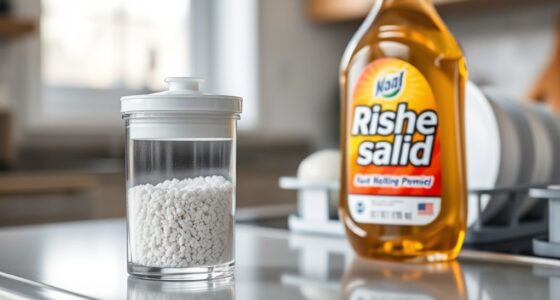To clean your oven and stovetop without chemicals, start by making a paste of baking soda and water. Apply it to greasy spots and baked-on spills, then let it sit overnight. Afterward, spray with a mixture of water and vinegar, scrub with a sponge or brush, and rinse thoroughly. You can also use a plastic scraper for stubborn grime. Keep your cleaning natural and effective—more tips below will help you master the process.
Key Takeaways
- Use a baking soda and water paste to naturally loosen grime on oven and stovetop surfaces.
- Spray a vinegar and water mixture after applying baking soda paste to enhance cleaning power.
- Employ a plastic scraper and soft scrub brush to remove baked-on debris without damaging surfaces.
- Wipe with a damp cloth frequently to ensure complete residue removal and prevent streaks.
- Maintain regular cleaning to prevent heavy buildup and use proper ventilation during cleaning sessions.
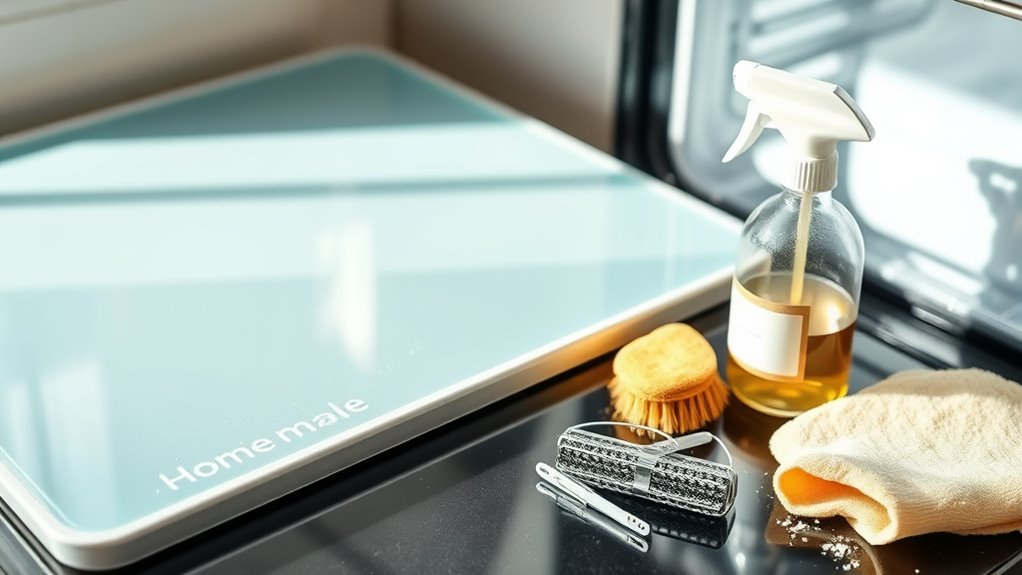
Cleaning your oven with natural methods is equally straightforward. Start by making a paste using baking soda and water. Spread this paste all over the interior surfaces of your oven, paying extra attention to greasy spots and baked-on spills. Let the paste sit for at least 12 hours or overnight. The baking soda works to break down grime without harsh chemicals. After the waiting period, spray the interior with a mixture of water and vinegar to help loosen residues. Use a scrub brush or sponge to wipe away the baking soda paste, rinsing frequently with a damp cloth. For tougher spots, you can repeat the process or use a plastic scraper to gently lift baked-on debris. This natural cleaning method keeps your oven hygienic and odor-free without exposing yourself to dangerous fumes. Additionally, adopting natural cleaning methods can contribute to a safer and healthier home environment.
Frequently Asked Questions
Are Natural Cleaning Methods Effective Against Tough Oven Stains?
Yes, natural cleaning methods can be effective against tough stains on your oven. You can use ingredients like baking soda and vinegar to break down grease and burnt-on food. Apply a baking soda paste, let it sit, then spray with vinegar for a fizzing reaction that lifts stubborn stains. Regular use of natural cleaning solutions can keep your oven looking clean without harsh chemicals, making your kitchen safer and eco-friendly.
Can Vinegar Damage the Stovetop Surface Over Time?
Sure, vinegar’s so gentle it might seem harmless, but it’s wise to contemplate vinegar safety and surface compatibility. Over time, frequent use on certain stovetop surfaces can cause subtle damage or dullness. While vinegar generally won’t ruin your stovetop, it’s best to spot-test first and avoid prolonged exposure on delicate finishes. With proper care, this natural cleaner can be effective without compromising your stovetop’s integrity—just don’t overdo it.
How Often Should I Clean My Oven Without Chemicals?
You should clean your oven without chemicals at least once a month to maintain proper oven maintenance and guarantee ideal performance. Regular cleaning helps prevent buildup of grease and food particles, making future cleaning easier. If you cook frequently or notice spills, increase your cleaning frequency accordingly. Using natural methods like baking soda and vinegar, you can keep your oven clean without harsh chemicals, extending its lifespan and keeping it safe for your family.
Is Baking Soda Safe for All Stovetop Materials?
Ever wonder if baking soda is safe for your stovetop? It generally is, but you should check your stovetop’s durability and baking soda compatibility first. For example, glass and ceramic surfaces usually handle baking soda well, while some delicate metals might not. Using baking soda can effectively clean without damage, as long as you avoid abrasive scrubbing on sensitive materials. Always test in a small, hidden area first to be safe.
Can These Chemical-Free Methods Eliminate Grease Buildup Completely?
Chemical-free methods can markedly reduce grease buildup, but they might not eliminate it completely, especially in stubborn spots. These methods work through physical action and natural reactions, minimizing environmental impact and avoiding harsh chemical reactions. To maximize effectiveness, you may need to repeat the process or combine different natural cleaning techniques. Consistent maintenance will keep your stovetop and oven cleaner over time without harming the environment or your health.
Conclusion
Now that you know how to clean your oven and stovetop without chemicals, you’re armed with a natural toolkit like a gardener tending to delicate blooms. Think of your kitchen as a well-kept garden—pristine, healthy, and inviting. With regular care and eco-friendly solutions, you’ll keep your cooking space shining brightly, free from harsh toxins. Embrace these simple methods, and watch your kitchen blossom into a clean, safe sanctuary where every meal begins with confidence.
